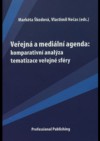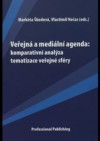The proposed project aims to map out, analyse and describe agenda-setting and agenda-linking
processes in the Czech public and in the Czech mass media agenda. To get the necessary empirical data, in an empirical survey, the bidding team aims to apply the agenda-setting theory in a comparative analysis of Czech media and the hierarchy of issues reflected by the Czech public. The "first-level analysis" is necessary for further agenda-setting research which has not been undertaken on a systematic level in the Czech Republic so far. Public agenda will be studied by the Public Opinion Research Centre of the Institute of Sociology of the Academy of Science of the Czech Republic (SOÚ AV CR) through a representative panel of respondents; the media agenda will be examined by the Department of Media Studies of the Institute of Communication Studies and Journalism, Faculty of Social Science, Charles University, Prague (KMS IKSŽ FSV UK) through a representative sample of media content.
Co-researcher: Mgr. Vlastimil Nečas, KMS IKSŽ FSV UK
Project publications (total 15, displaying 1 - 10)
The article stands as a first part of a series about the question answering process. The interview situation is defined thru its interactional/communication, cognitive and formal components. The answering process is described in the course of the question interpretation, memories retrieval, making the judgement and editing the answer. The first part of the series concentrates on the interpretation phase.
abstract
The chapter analyses stability of answers to party identification question using the panel survey. The basic hypothesis stemming from the classical conceptualization of the party identification is its stability of the intensity and the direction. Although on the aggregate level the stability is high, at the individual level there is quite high inconsistency in answering the question in around 30 per cent of cases.
The aim of this article is to signify the profile of the Czech politoval parties from the point of view of thein voters and with reference to some fundamentals determinant of voting behaviour. Text tries to apply the teoretic bases and empirical research to the current Czech party system.
The article stands as the third part of a series about the question answering process during standardized surveys and elaborates the judgment making phase. The first part deals with attitude questions. In this regard, relevant theories of the nature of attitude are explained; context effects that influence decision-making processes in the course of answering are described and the effect of affective reactions like emotions is mentioned.
The article stands as a second part of a series about the question answering process during standardized surveys. In case of memory retrieval phase the main psychological conceptions of memory are introduced and issues of factual information retrieval, initial encoding of the information, the role of cognitive keys, the problem of inaccessible information and the usage of more general parts of autobiographical memory are discussed.
The chapter is dedicated to testing of validity of classical agenda-setting hypothesis in Czech environment per panel data from the second quarter of 2008. The analysis has shown that the hypothesis is valid on both individual and macro levels but its validity is not universal for all issues. Relations of media and public agendas differ not only depending on the subject matter but they are also different on macro and micro level in case of the same issue.
The text with some additions introduces to Czech audience a work of Scott L. Althaus and Devon M. Largio, who back in 2004 were analyzing origins and consequences of shift in America’s public enemy no. 1 from Osama bin Laden to Iraqi president Saddam Hussein that occurred during period after 9/11 terrorist attacks on WTC and Pentagon and before U.S. invasion of Iraq in 2003.
The following text outlines some aspects of people´s decision making process during elections in modern mass democracies. Particularly, the aspect of (in)competence of electorate or, as the case may be, the problem of rationality of the political audiance that creates the public opinion. The arguments proving the discrepancy between the normativ and the empiric character of public opinion are purposly disbalanced based on the evaluation of reality.
The chapter is focused on description and analysis of data from panel survey and independent public opinion surveys conducted in the second quarter of 2008 concerning respondent’s answers to a question which recent all-society events they consider to be most important.





Facebook
Twitter